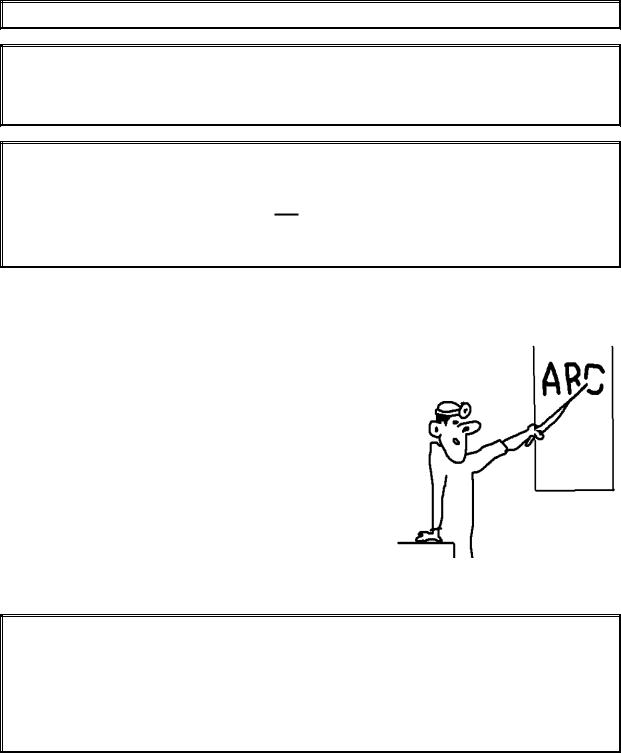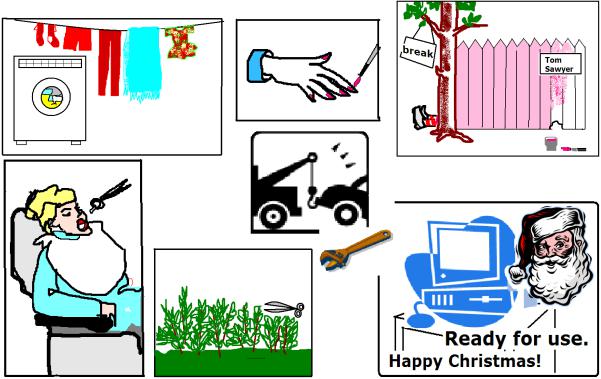
Unit 1
.pdf
13
6. The TV set will have fixed by Friday. 7. No dress can mended so fast, even by Mother. 8. My watch was still mended when I called again. Naturally, I got angry. 9. The exhibition attended several important art critics who praised most of the exhibits. 10. Could you wait a bit? Your dress is ironed. It’ll be ready in ten minutes.
20. Fill in the blanks, opening the brackets. Mind the tense.
1. When ___ the house ___ (paint) last? 2. Very soon teeth ___ (fill and extract) in a different way. 3. ___ the new computer ___ (deliver) yet? 4. Flowers on the dinner table ___ (arrange) by women as a rule. 5. Chimneys ___ (sweep) by professionals in the 19th century. 6. The tap is leaking again. When ___ it ___ (fix) properly? 7. Meat ___
usually ___ (cook) by men, not women, in the Caucasus. 8. We were surprised to learn that the seaside scenes of the film ___ (shoot) in a studio. 9. Central heating ___ (install) yet, we can’t move in. 10. The firm promised that we ___ (contact) within a week.
Not all verbs can be used in passive forms.
There are some verbs which never produce passive forms, for example have, lack, become, suit, fit, resemble, etc.
My father has two cars. (no passive)
21. Tick off the sentences which can’t be transformed into passive.
1. We need a new manager. 2. I have a room of my own. 3. Some people lack tact. 4. Most girls resemble their mothers at least a little. 5. He fitted a new lock not long ago. 6. You can’t have a bath in a hostel. 7. The shirt doesn’t match the blouse. 8. Do your shoes fit you? 9. The dress doesn’t really become her. 10. Does the offer suit you?
Passive forms which name an action (действие)
(The book was illustrated by a famous artist in the last century.) shouldn’t be confused with
compound nominal predicates which describe a state (состояние) (The book was beautifully illustrated.)
22. Tick off passive forms (expressing actions, not states).
1. I’m bored to death. 2. Why wasn’t the belt fastened when they found him? 3. The window latch hadn’t been fastened properly. 4. A bore is bored by anything. 5. The windows of the house were all lighted. 6. We were very much surprised when we heard the news. 7. Why wasn’t the
14
belt fastened when the stewardess told everybody to do it? 8. He was universally admired for his courage. 9. She was distressed and looked very pale. 10. The door was still closed at noon. 11. If the door is locked in time, nothing happens. 12. He was promised something fantastic.
23. Insert passive forms of suitable verbs.
1.Bread ___ not only at the baker’s. 2. Such jam ___ from oranges.
3.When the test is over, all the papers must ___ in. 4. The new shopping centre ___ next week. 5. The ship sank but the crew ___ by the rescue party. 6. Her parents have a car, and she ___ to school every day. 7. The salad tasted delicious because it ___ with fresh cream. 8. They brought the family album, and I ___ some amusing pictures. 9. There was nobody in, and Mother wondered who the mess
___ by. 10. The teacher said all the tests ___ by the next day.
11.The newspapers said some precious jewelry ___ from the bank.
12. Our car is in the garage, but we can’t drive it, it ___ yet.
13. Everybody is waiting, the results of the exam ___ soon. 14. By the time Mother came, the house ___ thoroughly. 15. Last week a fiveday strike ___ by postmen. 16. The escaped prisoner ___ so far. 17. Look at the untidy lawn, the grass ___ yet. 18. Clearly, the crime
___ by at least two people. 19. Water must ___ before drinking.
20.When you ___ a present, you’re supposed to thank the person.
24.Translate from Russian into English orally.
1.Почту доставляют утром. 2. Почту уже доставили? 3. Почту принесут после обеда. 4. Почту доставят к понедельнику. 5. Мне вчера сказали, что почту уже доставили. 6. Окна вчера помыли.
7.Окна еще не помыли. 8. Окна помыли, а пол был грязный. 9. как раз мыли окна, когда началась буря. 10. Мне обещали, что окна помоют.
11.Машину как раз ремонтируют. 12. Машина как раз ремонтировалась в то время. 13. Мы и не надеялись, что машину отремонтируют к нашему отпуску. 14. Вас уже обслуживают?
15. Мы огорчились, потому что поняли, что работа будет испорчена. 16. Скоро будут выпущены новые учебники. 17. Виновных уже наказали, когда пришел директор. 18. Когда у вас установили телефон? 19. Этот закон как раз в то время обсуждали. 20. Боюсь, рейс отменят.
*21. Интересно, сколько ей платят? 22. Из чего сделано это блюдо? 23. Она почувствовала, что за ней следят. 24. Кто это

15
сказал? 25. Боюсь, кто-нибудь обидится на твою шутку. 26. Почту доставляют почтальоны. 27. С врачом сразу посоветовались? 28. Мне подарили вчера такой большой торт! 29. Тебя тоже пригласили на вечеринку? 30. Мне об этом не говорили.
*31. Кто-то, наверняка, будет наказан. 32. Кто открыл Америку? 33. Я не люблю, когда меня дразнят. 34. Деньги можно зарабатывать, а можно – делать. 35. Меня опять обманули! 36. Всѐ уже раскупили? 37. Что можно сделать в такой ситуации? 38. Любую информацию легко получить через Интернет. 39. В этом доме когда-нибудь жили? 40. Тебя разбудили в шесть?
*25. Complete the sentences using passive forms.
1.Some news … 2. Lots of time … 3. Half the exotic fruit …
4.Telephone messages … 5. Babies … 6. Flowers … 7. Cars …
8.Newspapers … 9. Trees in town … 10. Some businessmen …
11.Ages ago trousers … 12. Some recent discoveries … 13. The last Olympics … 14. Not long ago some laws … 15. A century ago women … 16. In old times gold … 17. The injured child … 18. Last month our house … 19. Not long ago my lungs … 20. The last test …
21.Some exercises have just … 22. So far few pupils have …
23.My fears concerning exams have rarely … 24. Many messages have already … 25. My whole life has … 26. My grant has already …
27.Our TV has recently… 28. The prices have … yet. 29. Exams have always … 30. Russia has never …
In passive constructions different prepositional objects can be used. Be careful – they differ in meaning:
The preposition |
by indicates the doer. |
The elephant was killed by a falling stone. |
|
The preposition |
with indicates the instrument. |
The elephant was put to sleep with a poisoned bullet.
made of indicates the material used
without any technological changes in it.
The table is made of wood, plastic and glass. made from shows that the material is used
with some technological changes in it.
Paper is made from wood.

16
The addressee (адресат) can be introduced by 1. the preposition “to” (in most cases)
The rest of it was sent back to Lanny.
2. by the preposition “for” (with some verbs – cut, buy, save, etc.)
The cake was bought for the children, not for you. Leave it alone.
26. Match the parts, using the verb in the passive form.
Model: My clothes are paid for by mum or dad.
1. |
Our newspapers |
grind |
|
a |
by the hotel |
|
|||
2. |
Hot breakfasts |
design |
|
b |
by a professional |
|
|||
3. |
Coffee |
pay |
|
c |
by a postman |
|
|||
4. |
Her wedding dress |
serve |
|
d |
by loving parents |
|
|||
5. |
Some young people’s bills |
deliver |
|
e with a coffee grinder |
|
||||
|
|
|
|
|
|
|
|
||
6. |
Some halls |
|
mop |
|
a with a golden cup |
|
|||
7. |
Bitter medicine |
|
decorate |
|
b |
with a cloth |
|
||
8. |
The winner at some contests |
handle |
|
c |
with pleasure |
|
|||
9. |
The water spilt on the floor |
|
take |
|
d |
with care |
|
||
10. |
Weapons should |
|
give |
|
e |
with posters |
|
||
|
|
|
|
|
|
|
|
||
11. |
Compositions can’t |
|
bind |
|
a |
by the police |
|
||
12. |
Parcels may |
|
investigate |
|
b |
with a pencil |
|
||
13. |
A dinner at a restaurant |
|
write |
|
c |
by naughty children |
|
||
14. |
Crimes |
|
make |
|
d |
with a string |
|
||
15. |
The mess in the house |
|
pay |
|
e by check or in cash |
|
|||
27. Insert proper prepositions.
1.The house was redecorated ___ pros. 2. The entrance to the house was decorated ___ garlands. 3. The table should be covered ___ a clean tablecloth before dinner. 4. Was the table laid ___ an inexperienced waiter? 5. He was wounded ___ bullet. 6. The elephant was put to sleep ___ a poisoned bullet. 7. He was hurt ___ her words.
8.Can a deep pit be dug ___ such a small spade? 9. Cream is made
___ milk. 10. New laws can’t be made ___ the police.
11.Is the blouse made ___ natural silk? 12. Now we see what he is really made ___ ! 13. Coffee can be served ___ cream. 14. Last time the salad was made ___ cucumbers and tomatoes. 15. Some students are woken only ___ the bell. 16. Cabbage soup is often cooked ___

17
tomatoes. 17. Cabbage soup can be only improved ___ sour cream.
18. Who was the letter written ___ ? 19. The car wasn’t really bought
___ you. What is more it was bought __ my parents, not yours. 20. Are they well provided for ___ the state or somebody else?
*28. Restore the sentences using a suitable preposition.
injections/syringe |
injections/nurse |
flowers/women |
doors/keys |
applications/ |
on the 8th of March/ |
the head of the department |
flowers/mostly men |
jewels/rich women |
bricks/clay |
taps/plumbers |
paper/scissors |
Verbs with two objects (direct and indirect)
|
They’ll send |
you(indirect) another form(direct) soon. |
|||
|
can form two different passive constructions. |
||||
|
|
||||
|
The list of ditransitive verbs (verbs with two objects) |
||||
|
allow |
|
give |
promise |
|
|
ask |
|
grant |
refuse |
|
|
answer |
|
lend |
teach |
|
|
envy |
|
offer |
tell |
|
|
forgive |
|
pay |
|
|
1. the direct object becomes the subject of the passive construction
Another form was sent to us the other day.
2. the indirect object becomes the subject of the passive construction
We were sent a new form.
The person (the indirect object) is preferable as the subject of the passive construction
We were sent a new form to fill in.
29. Transform the following sentences from active into passive.
1.Most parents don’t allow their children to smoke in the flat.
2.Englishmen give a lot of people presents at Christmas. 3. Banks lend farmers great sums of money. 4. Nobody has ever offered me a well-paid job. 5. Russian teachers teach Russian children English.

18
6. In my childhood I told my parents only the truth. 7. When he was working in the USA, they paid him 10 dollars a day. 8. Some mothers refuse their children nothing. 9. Teachers sometimes ask us strange questions. 10. I usually cut my husband some sandwiches for his lunch break. 11. My boyfriend will never forgive me flirting with other boys. 12. They only promise us a pay rise.
Some verbs with two objects produce only one passive construction.
It happens if the indirect object after them requires the preposition for.
They bought me a new suit. They bought a new suit for me. A new suit was bought for me.
It happens if the indirect object is always a prepositional one
(describe, dictate, explain, suggest, etc.). Explain the rule to us once more, please.
The rule should be explained (to us) once more.
(the only possible passive)
*30. Transform the sentences into passive. Produce two constructions where possible. Give the preferable one first.
1.She is dictating the rules to us again.
2.Nobody explained anything to us. 3. She sent me a wonderfully warm letter just after that. 4. Mum cut me some sandwiches. 5. They will show you some letters. 6. They suggested to me that my mum should edit my applications. 7. I have never bought her flowers. 8. She didn’t describe her flat to me in detail. 9. Will you save me some milk? 10. His boss promised him a rise.
In English a prepositional object or even an adverbial modifier
can become the subject of the passive construction
She had never been spoken to like that. Clearly, the room has never been lived in.

19
The list of verbs with prepositions that can be used in passive constructions
account for |
listen to |
send for |
make fun of |
agree upon |
look (stare, etc.) at |
speak (talk) about |
make use of |
call on |
look for |
speak (talk) to |
put an end to |
comment on |
pay for |
think of |
take notice of |
count on |
provide for |
touch upon |
take care of |
deal with |
put up with |
wait for |
live in |
interfere with |
refer to |
dispose of |
sleep in |
laugh at |
rely on |
hear of |
sit in/on |
*31. Translate all the verbs in the frame above into Russian. Do
it in writing. |
|
Model: account for |
объяснять, указывать причину |
agree upon |
приходить к согласию по поводу |
*32. Complete, using a suitable verb from the table above.
Model: The dinner at an expensive should be paid for.
1. Nobody likes to ___ 2. Not all men can ___ 3. In a brief summary only the most important thing must ___ 4. Teachers are supposed to
___ 5. When somebody falls ill, a doctor has ___ 6. Even ridiculous people oughtn’t to ___ 7. The old and the sick need to ___ 8. Some chairs here can hardly ____ 9. Absence from class should always ___
10. When children play and are happy, they shouldn’t ___, even if they are a bit too noisy.
*33. Translate from Russian into English.
1.А их ищут? 2. За это заплатили? 3. Когда вызвали врача?
4.О вас позаботятся. 5. О родителях не подумали. 6. С такими вещами нельзя мириться. 7. От мусора надо избавляться. 8. Этим можно воспользоваться? 9. Насколько хорошо их обеспечивают?
10.Не люблю, чтоб на меня глазели.
Constructions to have something done and to get something done
show that the subject of the sentence doesn’t perform the action.
I do my hair. I have my hair done at the hairdresser’s.
We have our carpets cleaned every six months. We had our carpets cleaned last month.
We’ll have our carpets cleaned next month.
(Кто-то делает это по их заказу, просьбе)

20
The tense forms of these phrases are: |
|
|
|
|||
1. Present Simple |
have/has something done |
get/gets something done |
||||
2. Past Simple |
had something done |
got something done |
|
|||
3. Future Simple |
will have something done |
will get something done |
||||
4. Present Perfect |
have had something done |
have got something done |
||||
5. Past Perfect |
had had something done |
had got something done |
||||
6. Future Perfect |
will have had something done |
will have got something done |
||||
7. Present Progressive |
am/is/are |
having |
something |
am/is/are |
getting |
something |
|
done |
|
|
done |
|
|
8. Past Progressive |
was/were |
having |
something |
was/were |
getting |
something |
|
done |
|
|
done |
|
|
9. Future-in-the-Past |
would have something done |
would get something done |
||||
Simple |
|
|
|
|
|
|
10. Future-in-the-Past |
would have had |
something |
would have got something done |
|||
Perfect |
done |
|
|
|
|
|
*34. Match the two parts of the sentence: from the columns on the left and on the right.
1. |
Stray dogs don’t have |
their suits dry-cleaned. |
2. |
Some men often have |
their shopping done for them. |
3. |
Englishmen have |
new glasses made for them from time to time. |
4. |
Most Americans have |
it delivered on the same day. |
5. |
People with weak eyesight have |
their hedges trimmed regularly. |
6. |
Russians seldom have |
their voice recorded. |
7. |
If you buy furniture, |
a leaking tap fixed. |
|
you usually have |
|
8. |
Anybody can have |
their nails polished or their tails combed. |
9. |
Poor women can’t have |
their chimneys swept. |
10. In Russia it’s not easy to have |
their houses painted nearly every year. |
|
The phrase get something done sometimes shows that the person provoked
the undesirable action in some way.
She got her leg broken again.
You’ll soon get yourself caught if you go on like that!

21
*35. Insert a suitable tense form of the phrases to have something done or get something done.
1. |
She … her portrait … soon. |
paint |
2. They … the windows … not long ago. |
clean |
|
3. We must … our hedge … before the party. |
trim |
|
4. Where … you … your nails …? |
polish |
|
5. |
… he … his tooth … yet ? |
fill |
6. … they … their washing … when they lived in London? |
do |
|
7. They told me that they … already … their flat … |
redecorate |
|
8. |
He was sure he … his car … in an hour or two. |
service |
9. We can’t watch TV, we … our TV set … . |
repair |
|
10. I … my photo … for ages! |
take |
|
*36. Insert a suitable tense form of the phrases to have something done or to get something done.
1. When __ you ___ your flat redecorated last? 2. ___ you ever ___
your luggage taken to your room in hotels? 3. They said they ____ their party catered for. 4. I’m afraid Michael ___ his leg broken and can’t come. 5. It’s not easy ___ your silver polished properly. 6. You ___
shouted at if you disobey the boss again. 7. It was clear that the hostess
___ her hair styled just before the party. 8. Rich people ____ their decorations designed by professionals. 9. Paul left his bike outside and
___ it stolen. 10. If you ___ your tooth filled, it’ll start aching again.
*37. Complete the sentences using the structures to have something done or get something done.
1.Children don’t have
2.Men sometimes have
3.Englishmen have
4.Some Englishmen have
5.People with weak eyesight have
6.Russian women seldom have
7.If you buy a computer, you’ll have to have
8.Anybody can have
9.Russian men can’t have
10.In our country it’s not always easy to have

22
*38. A) Describe what some people are having done or have had done for them.
B) Bring some pictures and describe them in a similar way.
39. Translate into English.
1.Как часто ты стрижешься? 2. Где ты стриглась в прошлый раз?
3.Когда ты пострижешься? 4. Она в последнее время редко стриглась, да? 5. Она постриглась, и ее как раз причесывали. 6. Я сразу заметила, что мама постриглась. 7. Папа сказал, что скоро пострижется. 8. Где можно постричься? 9. Тебе обязательно надо постричься. 10. Стоит ли сейчас стричься?
*11. Ты сфотографировался? 12. Когда ты в последний раз делал рентген? 13. Не пора ли мне сделать маникюр. 14. Тому Сойеру в конце концов покрасили весь забор. 15. Некоторые любят, чтобы на них работали. 16. Когда нам, наконец, доставят мебель? 17. Замок вставили? 18. Он все хвастался своим сейфом, его и взломали.
19.Ты заправил машину? 20. Когда ты выдернешь этот зуб?! *21.Она сказала, что ковры ей почистили. 22. Когда я пришла, ей
делали укладку. 23. Тебе надо проверить зрение. 24. Я думала, они зарегистрировали багаж. 26. Ты уже сделала рентген? 27. Мы были удивлены, когда узнали, что он сломал ногу. 28. Вы когда-нибудь
